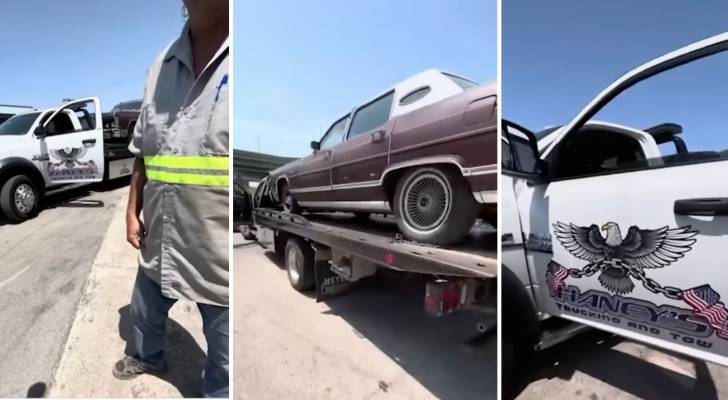
In Kansas City, Missouri, a local mechanic recently stopped a tow truck driver from hauling away a car he was actively working on at his shop by confronting the driver about allegedly violating state laws because he didn’t have the required documents for a legal tow. “We complained until they brought it back,” the owner of the shop told Fox 4 Kansas City. The driver claimed he didn’t know Missouri law requires a signed form from the property owner before a vehicle can be removed from private property.
Yet, the tow company involved is no stranger to controversy. The same company was the subject of a Fox 4 Kansas City investigation after a court handed down a $7.1 million judgment against it for similarly-predatory towing practices. That case highlighted a troubling pattern: unauthorized tows, inflated fees and drivers left scrambling to reclaim their cars.
Incidents like this underscore the risks Missouri drivers face in a state where consumer protections around towing are inconsistent and poorly enforced. Whether it’s an illegally parked car or a vehicle involved in an accident, the wrong tow can turn into a financial and legal nightmare.
Predatory towing is drawing fresh scrutiny nationwide, and with reason. It’s a practice known to exploit drivers through inflated rates, unsolicited arrivals at accident scenes, unauthorized removals and refusal to release vehicles or cargo within a reasonable timeframe, leaving drivers in a bind.
Across the country, predatory tows can involve impounding vehicles, piling on dubious “administrative fees” and using pressure tactics at chaotic accident scenes to obtain a driver’s signature, effectively voiding any protections that might apply to nonconsensual tows. According to a 2023 report by the American Transportation Research Institute (ATRI), nearly 30% of crash-related tows involve some form of predatory billing.
The issue cuts across class lines, hitting truck drivers, everyday commuters and accident victims alike. In the absence of strong state laws, knowing your rights may be your best defense.
Don’t miss
- I’m 49 years old and have nothing saved for retirement — what should I do? Don’t panic. Here are 6 of the easiest ways you can catch up (and fast)
- Want an extra $1,300,000 when you retire? Dave Ramsey says this 7-step plan ‘works every single time’ to kill debt, get rich in America — and that ‘anyone’ can do it
- Robert Kiyosaki warns of a ‘Greater Depression’ coming to the US — with millions of Americans going poor. But he says these 2 ‘easy-money’ assets will bring in ‘great wealth’. How to get in now
What you can do about predatory towing
Missouri is one of 18 states that require written authorization from property owners before vehicles are towed from private lots. The state also prohibits unsolicited towing on highways. But those protections can be shaky in practice.
Missouri lacks statewide caps on towing rates and doesn’t require towing companies to itemize charges on their invoices, meaning drivers often don’t know what they’re paying for until after they’ve paid it.
When dealing with a tow, always ask for a written invoice and do not sign anything under pressure. If your vehicle was towed from private property, request to see the written authorization from the property owner. In cases involving an accident, remember: you may have the right to request your own towing provider, but only if it doesn’t delay clearance or pose a safety risk.
Read more: You don’t have to be a millionaire to gain access to this $1B private real estate fund. In fact, you can get started with as little as $10 — here’s how
Avoiding predatory towing scams: Know before you park
The best defense is preparation. Here’s how to protect yourself:
- Know your state’s laws before you need them: Understand where you can and cannot legally park and where your vehicle may be susceptible to a tow.
- Read the signs: If parking on private property, look for clearly posted towing notices. If none exist, a tow may be illegal.
- Don’t rush into consent: If your vehicle is towed after a crash, don’t sign anything at the scene unless you’ve confirmed it won’t waive your rights. This is especially important if law enforcement called the tow.
- Take photos: Snap pictures of your vehicle’s location, any signage and the condition of the car before and after towing. This can help dispute inflated charges or wrongful tows.
- Ask for an itemized invoice ahead of time: If the tow operator can’t or won’t provide one, that’s a red flag.
- Contact your insurer: Some policies include towing coverage. Insurers often have experience negotiating unreasonable fees and may be able to get your vehicle released more quickly.
If you do fall victim to a predatory tow, file a complaint with your state’s Attorney General’s office and consider reaching out to a consumer protection attorney. In some cases, you can post a bond to retrieve your car while disputing the bill in court.
What to read next
- Financial aid only funds about 27% of US college expenses — but savvy parents are using this 3-minute move to cover 100% of those costs
- Here are the 6 levels of wealth for retirement-age Americans — are you near the top or bottom of the pyramid?
- Here are 5 ‘must have’ items that Americans (almost) always overpay for — and very quickly regret. How many are hurting you?
- How much cash do you plan to keep on hand after you retire? Here are 3 of the biggest reasons you’ll need a substantial stash of savings in retirement
Money doesn’t have to be complicated — sign up for the free Moneywise newsletter for actionable finance tips and news you can use. Join now.
This article provides information only and should not be construed as advice. It is provided without warranty of any kind.